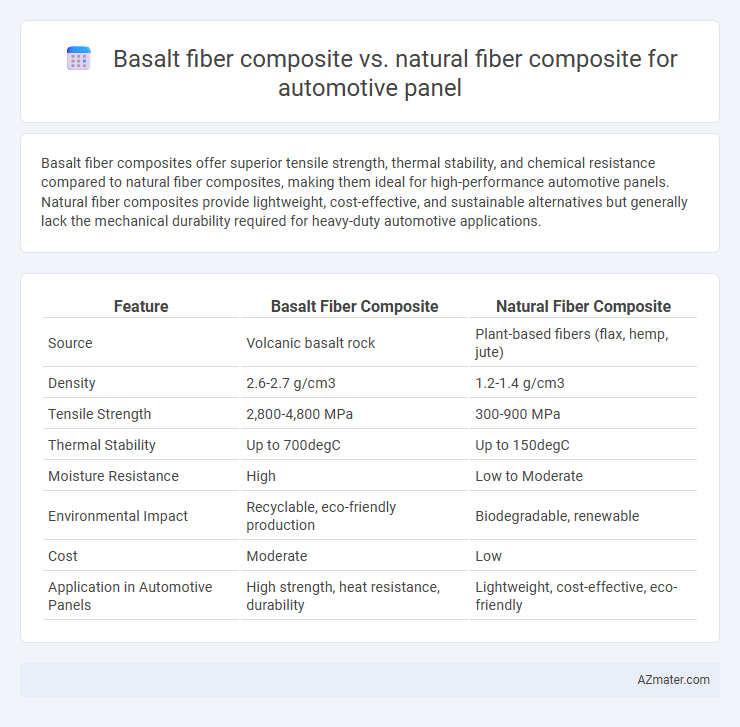Basalt fiber composites offer superior tensile strength, thermal stability, and chemical resistance compared to natural fiber composites, making them ideal for high-performance automotive panels. Natural fiber composites provide lightweight, cost-effective, and sustainable alternatives but generally lack the mechanical durability required for heavy-duty automotive applications.
Table of Comparison
| Feature | Basalt Fiber Composite | Natural Fiber Composite |
|---|---|---|
| Source | Volcanic basalt rock | Plant-based fibers (flax, hemp, jute) |
| Density | 2.6-2.7 g/cm3 | 1.2-1.4 g/cm3 |
| Tensile Strength | 2,800-4,800 MPa | 300-900 MPa |
| Thermal Stability | Up to 700degC | Up to 150degC |
| Moisture Resistance | High | Low to Moderate |
| Environmental Impact | Recyclable, eco-friendly production | Biodegradable, renewable |
| Cost | Moderate | Low |
| Application in Automotive Panels | High strength, heat resistance, durability | Lightweight, cost-effective, eco-friendly |
Introduction to Automotive Composite Materials
Basalt fiber composites offer superior mechanical strength and thermal stability compared to natural fiber composites, making them ideal for high-performance automotive panels. Natural fiber composites provide benefits like lower weight and enhanced biodegradability, contributing to sustainability and reducing vehicle environmental impact. Both materials improve fuel efficiency and reduce emissions, but basalt fiber composites excel in durability and resistance to harsh automotive conditions.
Overview of Basalt Fiber Composites
Basalt fiber composites, derived from volcanic basalt rock, exhibit high tensile strength, excellent thermal stability, and superior chemical resistance compared to natural fiber composites, making them ideal for automotive panel applications. Their enhanced durability and lightweight characteristics contribute to improved vehicle performance and fuel efficiency while maintaining structural integrity under demanding conditions. Basalt fibers also offer better moisture resistance and reduced environmental degradation, providing a longer lifespan for automotive interior and exterior panels.
Overview of Natural Fiber Composites
Natural fiber composites for automotive panels primarily utilize fibers such as flax, hemp, jute, and sisal embedded in polymer matrices, offering advantages in biodegradability, low density, and cost-effectiveness. These composites provide adequate mechanical properties, including tensile strength and impact resistance, suitable for semi-structural and interior automotive applications while reducing environmental impact compared to synthetic fibers. Challenges include moisture absorption and variability in fiber quality, which can affect durability and performance consistency in automotive panel production.
Mechanical Properties Comparison
Basalt fiber composites exhibit higher tensile strength, impact resistance, and thermal stability compared to natural fiber composites, making them more suitable for automotive panels requiring durability and safety. Natural fiber composites, such as those reinforced with flax or hemp, offer improved biodegradability and lower density but generally have lower mechanical strength and stiffness. The superior Young's modulus and fracture toughness of basalt fiber composites provide enhanced performance under dynamic loading and stress conditions in automotive applications.
Weight and Density Analysis
Basalt fiber composites exhibit a density of approximately 2.7-2.9 g/cm3, offering higher mechanical strength yet slightly greater weight compared to natural fiber composites, which typically have densities ranging from 1.2 to 1.5 g/cm3. The lower density of natural fiber composites contributes to significant weight reduction in automotive panels, enhancing fuel efficiency and vehicle performance. While basalt fiber composites provide superior durability and impact resistance, their increased density results in heavier components, making natural fiber composites more advantageous for lightweight automotive applications.
Environmental Impact and Sustainability
Basalt fiber composites offer superior environmental benefits compared to traditional synthetic materials due to their natural origin, recyclability, and lower carbon footprint, making them a sustainable choice for automotive panels. Natural fiber composites derived from materials like hemp or flax further reduce environmental impact through biodegradability and renewable sourcing, but often exhibit lower mechanical performance and durability compared to basalt fiber composites. Selecting basalt fiber composites enhances sustainability in automotive applications by balancing environmental considerations with strength and longevity requirements.
Cost Effectiveness and Market Availability
Basalt fiber composites offer higher mechanical strength and thermal stability compared to natural fiber composites, but they typically come at a higher cost due to more complex manufacturing processes. Natural fiber composites, such as those reinforced with hemp or flax, provide cost-effective and sustainable alternatives with greater market availability, benefiting from abundant raw materials and lower processing expenses. Automotive panels integrating natural fibers are increasingly favored for mass production, while basalt fiber composites suit applications demanding enhanced durability despite premium pricing.
Manufacturing Processes and Compatibility
Basalt fiber composites offer superior thermal stability and chemical resistance during automotive panel manufacturing compared to natural fiber composites, enabling more consistent curing processes and reduced material degradation. Manufacturing processes for basalt fiber composites typically involve high-temperature molding techniques such as compression and resin transfer molding, which require equipment compatibility with higher processing temperatures, whereas natural fiber composites utilize lower temperature processes like hand lay-up or vacuum infusion due to their sensitivity to heat and moisture. The compatibility of basalt fibers with thermosetting resins enhances mechanical strength and durability in automotive panels, while natural fibers demand careful moisture control and surface treatment to maintain adhesion and prevent degradation over time.
Performance in Automotive Panel Applications
Basalt fiber composites offer superior mechanical strength, thermal resistance, and durability compared to natural fiber composites in automotive panel applications. Their higher impact resistance and dimensional stability under varying temperatures enhance vehicle safety and longevity. Natural fiber composites provide lightweight and eco-friendly solutions but generally exhibit lower strength and moisture resistance, limiting their performance in demanding automotive environments.
Future Prospects and Industry Trends
Basalt fiber composites offer superior thermal stability, mechanical strength, and corrosion resistance compared to natural fiber composites, positioning them as a promising choice for high-performance automotive panels in future lightweight vehicle designs. Industry trends indicate a growing adoption of basalt fiber reinforced polymers due to their enhanced durability and sustainability benefits, meeting stringent automotive safety and environmental standards. However, natural fiber composites continue to attract interest for cost-effective, eco-friendly applications driven by increasing consumer demand for green materials in mass-produced electric and hybrid vehicles.

Infographic: Basalt fiber composite vs Natural fiber composite for Automotive panel
 azmater.com
azmater.com